Click on images to enlarge
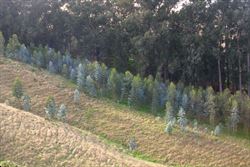
infestation of saplings (Photo: Forest and Kim Starr, USGS)
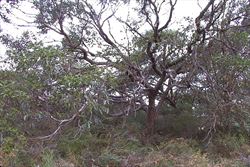
habit (Photo: Jackie Miles and Max Campbell)
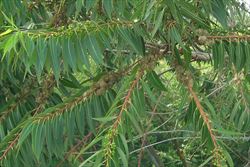
stems and leaves (Photo: Forest and Kim Starr, USGS)

leaves and flower buds (Photo: Jackie Miles and Max Campbell)
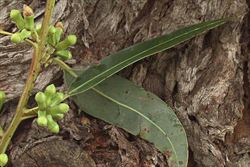
bark, leaves and flower buds (Photo: Jackie Miles and Max Campbell)
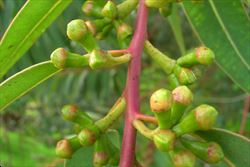
close-up of young branch and flower-buds (Photo: Forest and Kim Starr, USGS)
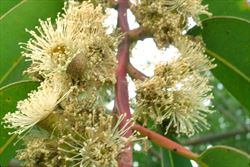
flowers (Photo: Forest and Kim Starr, USGS)
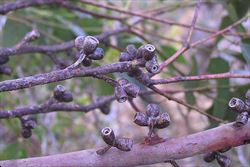
older branches and mature fruit (Photo: Jackie Miles and Max Campbell)
Scientific Name
Eucalyptus botryoides Sm.
Synonyms
Eucalyptus botryoides Sm. var. botryoidesEucalyptus botryoides Sm. var. platycarpa BlakelyEucalyptus platypodos Cav.Eucalyptus saligna Sm. var. botryoides (Sm.) MaidenEucalyptus saligna Sm. subsp. botryoides (Sm.) Passioura & J.E. Ash
Family
Myrtaceae
Common Names
bangalay, southern mahogany, swamp mahogany, Sydney bangalay
Origin
Native to the coastal districts of south-eastern Australia (i.e. the coastal districts of central and southern New South Wales, south from the Hunter River, and eastern Victoria).
Naturalised Distribution
Naturalised in the coastal districts of south-western Western Australia and beyond its native range in the central and western parts of Victoria.
Also naturalised on Norfolk Island and in Hawaii.
Notes
Bangalay (Eucalyptus botryoides ) has been cultivated beyond its native range in Australia as an ornamental plant, particularly in coastal areas close to the sea. It has escaped cultivation and is now regarded as an environmental weed in Western Australia and in those parts of Victoria outside its native range.
In central and western Victoria it is already widespread, and it is thought to pose a serious risk to heathlands, dry sclerophyll forests and lowland grasslands in this region. In Western Australia it has become naturalised around the edges of winter-wet swamps.

